Imagine your canine companion as a detective, sniffing out delicious treats in search of the ultimate reward. But beware, for lurking among the savory scents of our human foods are hidden dangers that could harm your four-legged friend. In this discussion, we will uncover the top 10 treacherous foods that can pose a threat to your dog’s well-being. From the tempting richness of chocolate to the unsuspecting toxicity of onions and garlic, each item on this list holds secrets that could leave you astonished. Stay tuned to learn more about these hazardous human indulgences and how they can affect your furry companion.
Key Takeaways
- Chocolate, grapes and raisins, onions and garlic, and xylitol are some of the most dangerous human foods for dogs.
- These foods can cause various health issues in dogs, such as increased heart rate, kidney failure, anemia, and drops in blood sugar levels.
- Avocado and alcohol are also toxic to dogs and can lead to symptoms like vomiting, diarrhea, and difficulty breathing.
- Dairy products, raw/undercooked meat and eggs should be avoided as well due to digestive issues and the risk of bacterial contamination.
Chocolate

Chocolate is an extremely dangerous human food for dogs due to its toxic effects on their health. While it may be tempting to share a piece of chocolate with your furry friend, it is important to understand the risks involved. Chocolate contains theobromine and caffeine, both of which are toxic to dogs.
Theobromine is a stimulant that affects the central nervous system and cardiovascular system in dogs. It can cause increased heart rate, elevated blood pressure, and even seizures. Caffeine, on the other hand, can lead to restlessness, rapid breathing, and muscle tremors in dogs. These effects can be harmful and potentially life-threatening.
It is crucial for dog owners to be aware of chocolate alternatives and safe treats for dogs. There are many options available that can satisfy your dog’s cravings without putting their health at risk. Carob is a popular alternative to chocolate and is safe for dogs to consume. It has a similar taste to chocolate but lacks theobromine and caffeine. Additionally, there are various dog-friendly treats available in the market that are specifically made with safe ingredients for canine consumption.
Grapes and Raisins
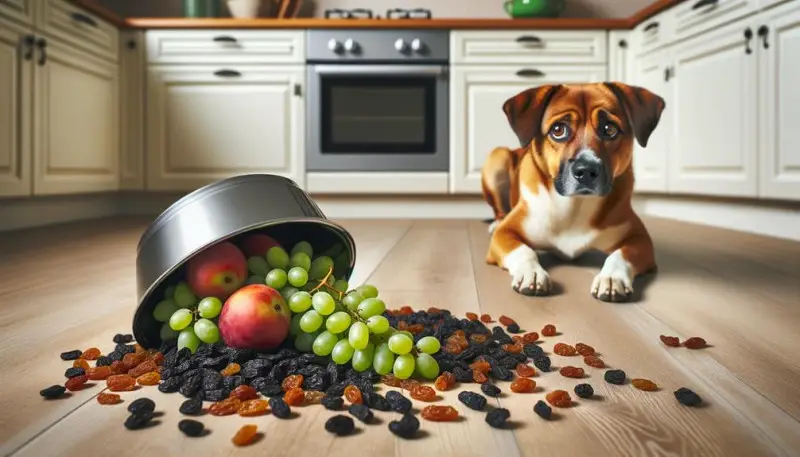
After understanding the risks associated with chocolate consumption for dogs, it is important to also be aware of another dangerous human food – grapes and raisins. Grapes and raisins may seem harmless, but they can actually be toxic to dogs. Here are some key points to know about preventing grape toxicity and the treatment for raisin ingestion:
- Preventing Grape Toxicity:
- Keep grapes and raisins out of reach: Dogs are known to scavenge for food, so it is important to keep grapes and raisins stored securely where your canine companion cannot access them.
- Be cautious with foods containing grapes or raisins: Some foods, such as fruit salads, trail mix, and baked goods, may contain grapes or raisins. Always check the ingredients before sharing any human food with your dog.
- Treatment for Raisin Ingestion:
- Seek veterinary assistance immediately: If you suspect your dog has ingested grapes or raisins, it is crucial to contact your veterinarian right away. Prompt medical intervention can help prevent serious complications.
- Induce vomiting: In some cases, the veterinarian may induce vomiting to remove the grapes or raisins from your dog’s system. However, this should only be done under professional supervision.
- Monitor for symptoms: Even if your dog does not show immediate signs of grape or raisin toxicity, it is important to keep a close eye on them for at least 24 hours. Symptoms may include vomiting, diarrhea, lethargy, decreased appetite, and increased thirst and urination.
Understanding the dangers of grapes and raisins is essential for keeping your furry friend safe. By taking precautions to prevent grape toxicity and seeking immediate veterinary care if ingestion occurs, you can help ensure the well-being of your beloved canine companion.
Onions and Garlic
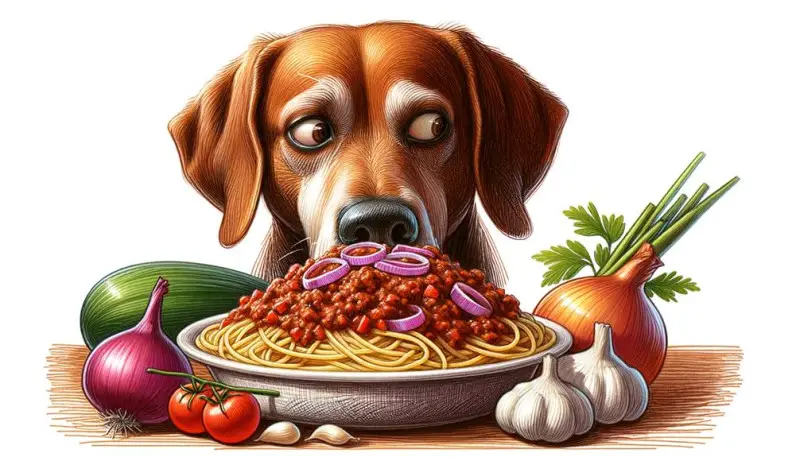
Onions and garlic pose a significant risk to dogs and should be avoided in their diet due to their potential toxicity. While these ingredients are commonly used in human food and offer various health benefits to us, they can be harmful to our furry friends. Onions and garlic belong to the Allium family, which also includes chives, leeks, and shallots. They contain compounds called thiosulphates, which can cause oxidative damage to a dog’s red blood cells, leading to a condition called hemolytic anemia.
Cooking tips involving onions and garlic should not be applied when preparing food for dogs. It is important to remember that even small amounts of these ingredients can be toxic to dogs. Therefore, it is best to avoid using them altogether. Instead, there are safe alternatives for flavoring food for your canine companion. Herbs such as parsley, basil, and oregano can be used to add a touch of flavor without posing any harm to your pet. Additionally, you can use low-sodium broths or bone broth to enhance the taste of your dog’s meals without compromising their health.
While onions and garlic offer health benefits to humans, such as antioxidant and anti-inflammatory properties, these benefits cannot be extended to dogs. It is crucial to prioritize your dog’s well-being and avoid feeding them foods that can be toxic. By understanding the potential risks associated with onions and garlic, you can ensure that your furry friend stays healthy and happy. Always consult with a veterinarian regarding your dog’s diet to ensure that you are providing them with safe and nutritious meals.
Xylitol (Artificial Sweetener)
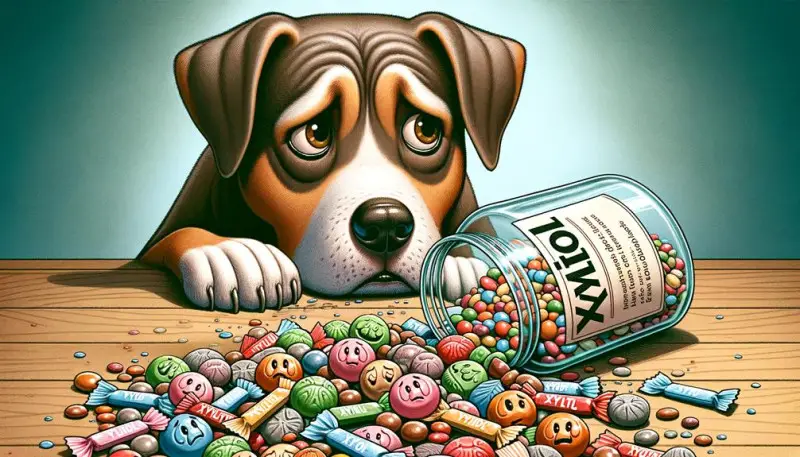
Xylitol, an artificial sweetener commonly found in sugar-free products, can be highly toxic to dogs. Ingesting even small amounts can lead to a rapid release of insulin, causing a dangerous drop in blood sugar levels. Symptoms of xylitol poisoning include vomiting, loss of coordination, seizures, and even liver failure. To protect your furry friend, it is crucial to prevent them from accessing any products containing xylitol and to seek immediate veterinary attention if you suspect ingestion.
Xylitol Toxicity in Dogs
Xylitol, an artificial sweetener, poses a dangerous toxicity risk to dogs. It is important to be aware of the prevalence of xylitol in common household products and to understand the alternative sweeteners that are safe for dogs. Here are some key points to consider:
- Prevalence of xylitol in common household products:
- Xylitol can be found in a variety of products, including sugar-free gum, candies, baked goods, toothpaste, and certain medications.
- Many people may not realize that these everyday items can be harmful to dogs if ingested.
- Alternative sweeteners for dogs:
- When it comes to giving your dog a sweet treat, it is best to opt for natural alternatives such as honey or fruits like apples and berries.
- It is important to remember that moderation is key, as even natural sweeteners can contribute to weight gain and other health issues in dogs.
Symptoms of Xylitol Poisoning
Symptoms of xylitol poisoning in dogs can range from mild gastrointestinal upset to life-threatening complications. Xylitol is an artificial sweetener commonly found in sugar-free products, such as candy, gum, and baked goods. When ingested by dogs, it can lead to a rapid release of insulin, causing a dangerous drop in blood sugar levels. Some common symptoms of xylitol poisoning include vomiting, diarrhea, weakness, seizures, and even liver failure. If you suspect that your dog has ingested xylitol, it is important to seek immediate veterinary care. Prevention tips include keeping all products containing xylitol out of your dog’s reach and checking labels carefully before sharing any human food with your furry friend. Emergency treatment options may include inducing vomiting, administering activated charcoal to absorb the toxin, and providing intravenous fluids to stabilize blood sugar levels. It is crucial to act quickly to ensure the best chance of a positive outcome for your dog.
Preventing Xylitol Ingestion
To prevent xylitol ingestion and protect your dog from potential harm, it is crucial to be vigilant in keeping all products containing this artificial sweetener out of their reach. Xylitol is highly toxic to dogs and can lead to severe health complications, including liver failure and hypoglycemia. Here are some important steps you can take to prevent xylitol poisoning in your furry friend:
- Read labels carefully: Check the ingredient list of any food or product before giving it to your dog. Look out for xylitol, which can sometimes be listed under other names such as sugar alcohol or E967.
- Secure trash cans: Make sure your dog cannot access the trash cans, as discarded items like gum wrappers or food packaging may contain xylitol.
- Educate family and friends: Inform everyone in your household and visitors about the dangers of xylitol and the importance of keeping it away from your dog.
Alcohol

Alcohol is extremely toxic to dogs and can lead to serious health problems or even death. If your dog accidentally ingests alcohol, it is important to be aware of the symptoms of alcohol poisoning, which include vomiting, diarrhea, coordination problems, and difficulty breathing. Seek immediate veterinary attention if you suspect your dog has consumed alcohol, as prompt treatment is crucial for their well-being.
Toxicity of Alcohol
The consumption of alcohol by dogs can be highly toxic and should be strictly avoided. Alcohol is not suitable for dogs and can have severe consequences on their health. Here are the risks of alcohol consumption in dogs:
- Toxicity of alcohol in dogs: Dogs are more sensitive to alcohol than humans due to their smaller size and different metabolism. Even small amounts of alcohol can cause alcohol poisoning in dogs.
- Symptoms of alcohol poisoning: Dogs that consume alcohol may experience symptoms such as vomiting, diarrhea, difficulty breathing, tremors, seizures, and even coma or death.
- Potential organ damage: Alcohol can cause damage to a dog’s liver, kidneys, and central nervous system. Prolonged alcohol consumption can lead to long-term health issues.
It is crucial to keep all alcoholic beverages out of reach of your dog to prevent accidental ingestion. If you suspect your dog has consumed alcohol, seek immediate veterinary care.
Symptoms of Alcohol Poisoning
If your dog has ingested alcohol, it is crucial to be aware of the symptoms of alcohol poisoning to ensure prompt and appropriate medical attention. Alcohol is highly toxic to dogs and can lead to serious health complications or even death if not treated immediately. The table below outlines the signs of alcohol toxicity in dogs:
| Signs of Alcohol Toxicity |
| Vomiting |
| Diarrhea |
| Weakness |
| Lethargy |
| Difficulty breathing |
Preventing alcohol poisoning in dogs is essential. Always keep alcoholic beverages out of your pet’s reach and never intentionally give alcohol to your dog. If you suspect your dog has ingested alcohol, contact your veterinarian immediately. Remember, early recognition of the symptoms and timely intervention can greatly increase the chances of a positive outcome for your furry friend.
Treatment for Alcohol Ingestion
Prompt and appropriate medical intervention is crucial for the treatment of alcohol ingestion in dogs. If you suspect that your dog has ingested alcohol, it is important to seek emergency care immediately. Here are some treatment options that may be recommended by a veterinarian:
- Inducing vomiting: In some cases, the vet may induce vomiting to remove the alcohol from the dog’s system. This should only be done under the guidance of a professional.
- Activated charcoal administration: Activated charcoal may be given to the dog to help absorb any remaining alcohol in the stomach.
- Intravenous fluids: Dogs with alcohol poisoning may be given intravenous fluids to maintain hydration and flush out toxins.
Avocado
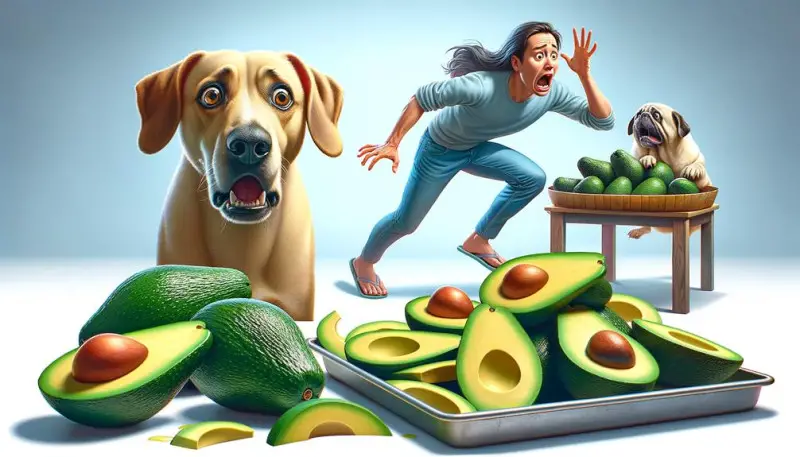
Avocado can be dangerous for dogs due to its toxic properties. While it may be a nutritious and healthy fruit for humans, it contains a substance called persin, which is toxic to dogs. Persin is found in the leaves, fruit, seed, and bark of avocado plants. Although the fruit itself has a lower concentration of persin compared to the other parts of the plant, it can still cause harm to your furry friend if ingested in large quantities.
Avocado toxicity in dogs can lead to symptoms such as vomiting, diarrhea, and abdominal pain. These symptoms typically occur within a few hours of ingestion and may persist for up to 24 hours. In more severe cases, dogs may also experience difficulty breathing, fluid accumulation in the chest, and even pancreatitis.
To help you better understand the potential dangers of avocado for your dog, take a look at the table below:
| Avocado Toxicity Symptoms | Avocado Parts to Avoid |
| Vomiting | Leaves |
| Diarrhea | Fruit |
| Abdominal Pain | Seed |
| Difficulty Breathing | Bark |
| Fluid Accumulation in Chest | |
| Pancreatitis |
It’s important to note that not all dogs will react the same way to avocado ingestion. While some dogs may show severe symptoms, others may only exhibit mild discomfort. However, it is always best to err on the side of caution and avoid feeding your dog any amount of avocado. If you suspect your dog has ingested avocado or is showing any symptoms of avocado poisoning, it is important to seek veterinary care immediately. Prompt treatment can help alleviate symptoms and prevent any further complications.
Coffee and Caffeine
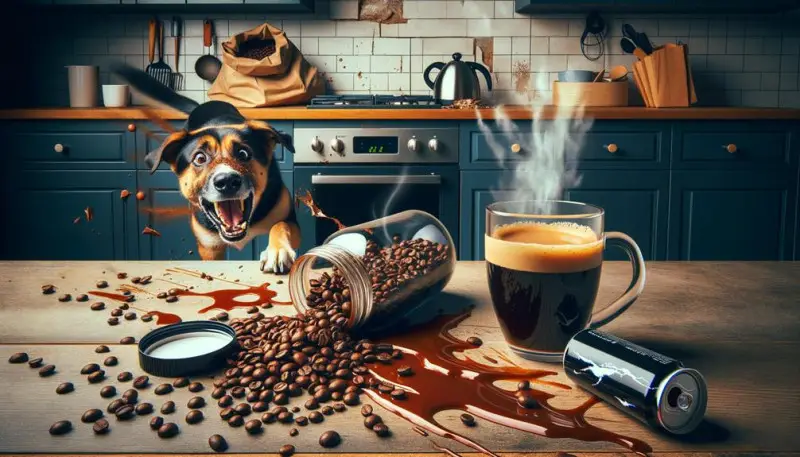
Coffee and caffeine may be a part of your daily routine, but for dogs, they can be extremely harmful. Caffeine is a stimulant that affects their central nervous system and can lead to caffeine poisoning. Symptoms of caffeine poisoning in dogs include restlessness, increased heart rate, tremors, and even seizures. It is crucial to keep coffee and products containing caffeine out of reach from your furry friends to avoid any potential risks.
Harmful Effects of Caffeine
Consuming caffeine, found in various beverages and foods, can have harmful effects on dogs. It is important to be aware of the potential dangers associated with caffeine ingestion in our furry friends. Here are the harmful effects of caffeine on dogs:
- Increased heart rate and blood pressure: Caffeine stimulates the nervous system, leading to an elevated heart rate and blood pressure in dogs.
- Nervous system stimulation: Dogs may experience restlessness, tremors, and even seizures when exposed to high levels of caffeine.
- Gastrointestinal upset: Caffeine can irritate the stomach lining, leading to vomiting, diarrhea, and abdominal pain in dogs.
- Dehydration: Caffeine acts as a diuretic, increasing urine production and potentially causing dehydration in dogs.
Symptoms of Caffeine Poisoning
Excessive consumption of caffeine by dogs can lead to caffeine poisoning, which manifests through a range of symptoms. It is crucial to be aware of these symptoms to prevent further complications and provide timely treatment for caffeine ingestion.
Symptoms of caffeine poisoning in dogs typically include restlessness, rapid breathing, increased heart rate, muscle tremors, and vomiting. The dog may also exhibit hyperactivity, agitation, and an inability to relax. Severe cases can result in seizures, collapse, and even death.
If you suspect your dog has ingested caffeine, it is important to seek veterinary assistance immediately. The veterinarian may induce vomiting to remove the caffeine from the dog’s system. Activated charcoal may also be administered to absorb any remaining caffeine in the digestive tract. Supportive care, such as intravenous fluids and medications to control symptoms, may be necessary.
Macadamia Nuts

Macadamia nuts can pose a significant risk to dogs if ingested. While these nuts are a popular snack for humans, they contain toxins that can be harmful to our canine companions. It is important to be aware of the dangers associated with macadamia nuts and take steps to prevent your dog from consuming them.
Here are two key points to consider:
- Macadamia nut allergies: Just like humans, dogs can develop allergies to certain foods, including macadamia nuts. Allergic reactions can range from mild to severe and may include symptoms such as itching, swelling, vomiting, diarrhea, and difficulty breathing. If your dog experiences any of these symptoms after consuming macadamia nuts, it is crucial to seek veterinary attention immediately.
- Health benefits of macadamia nuts: While macadamia nuts are packed with nutrients that are beneficial to humans, such as healthy fats, vitamins, and minerals, these benefits do not extend to dogs. In fact, the high fat content in macadamia nuts can be particularly problematic for dogs, as it can lead to pancreatitis, a painful and potentially life-threatening condition. Additionally, the toxins present in macadamia nuts can cause neurological symptoms in dogs, including muscle weakness, tremors, and an inability to walk.
To protect your furry friend from the dangers of macadamia nuts, it is essential to keep these nuts out of their reach. Be mindful of any foods that contain macadamia nuts, such as cookies or granola bars, and ensure that they are stored securely. If you suspect that your dog has ingested macadamia nuts or is experiencing any symptoms after consuming them, do not hesitate to contact your veterinarian for guidance and assistance.
Dairy Products

Dogs should exercise caution when consuming dairy products due to the potential risks they pose to their health. While dogs may enjoy the taste of dairy, their digestive systems are not equipped to handle lactose, the sugar found in milk and other dairy products. Feeding dogs dairy products can lead to a range of gastrointestinal issues, including diarrhea, vomiting, and abdominal pain.
One of the main dangers of feeding dogs dairy products is lactose intolerance. Most dogs lack the necessary enzyme, lactase, to break down lactose. As a result, undigested lactose can ferment in the gut, causing discomfort and digestive problems. Additionally, consuming large amounts of dairy can lead to pancreatitis, a painful inflammation of the pancreas.
If you want to treat your dog with a dairy-like snack, there are alternatives that are safer and healthier. One option is lactose-free dairy products specifically formulated for dogs. These products have the lactose removed, making them easier for dogs to digest. Alternatively, you can opt for non-dairy alternatives such as coconut milk or almond milk. However, it’s important to note that not all non-dairy alternatives are safe for dogs. Some may contain additives or sweeteners that can be harmful to their health. Always check the ingredient list and consult with your veterinarian before introducing any new food to your dog’s diet.
Raw or Undercooked Meat and Eggs
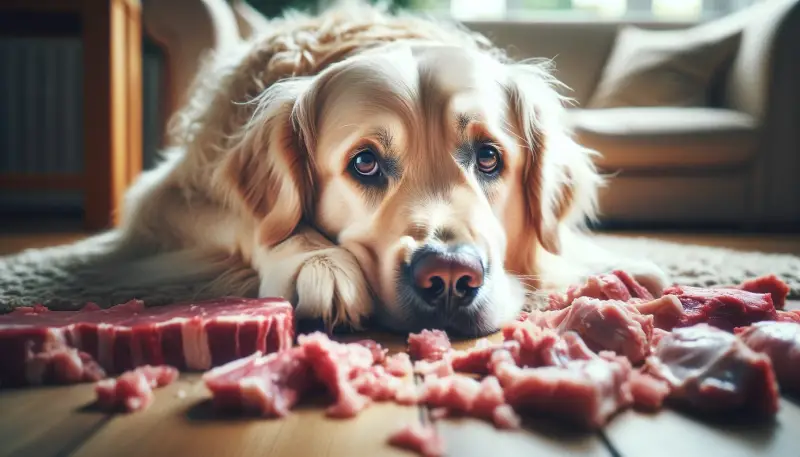
When it comes to ensuring the health and well-being of your canine companion, it is crucial to be aware of the potential dangers posed by feeding them raw or undercooked meat and eggs. While dogs are natural carnivores and can consume raw meat in the wild, domesticated dogs are at risk of various health problems when exposed to raw or undercooked meat and eggs. It is important to understand the risks associated with these foods to make informed decisions about your dog’s diet.
Here are the potential dangers of feeding your dog raw or undercooked meat and eggs:
- Raw meat risks:
- Bacterial contamination: Raw meat can be contaminated with bacteria such as Salmonella and E. coli, which can cause severe gastrointestinal issues in dogs. These bacteria can also be transmitted to humans, posing a risk to the entire family.
- Parasitic infections: Raw meat may contain parasites, such as Toxoplasma gondii and Trichinella spiralis, which can lead to serious health problems in dogs. These parasites can cause symptoms like diarrhea, vomiting, and even organ damage.
- Undercooked egg dangers:
- Salmonella poisoning: Undercooked eggs can harbor Salmonella bacteria, which can cause food poisoning in both dogs and humans. Symptoms may include diarrhea, fever, and abdominal pain. In severe cases, it can lead to dehydration and even death.
- Biotin deficiency: Raw egg whites contain avidin, a protein that can bind to biotin, a B-vitamin important for healthy skin and coat. Feeding your dog undercooked eggs consistently may result in a biotin deficiency, leading to skin problems and a dull coat.
To protect your dog from these risks, it is best to avoid feeding them raw or undercooked meat and eggs. Stick to properly cooked, high-quality pet food that meets their nutritional needs. If you have any concerns about your dog’s diet, consult with a veterinarian who can provide expert advice tailored to your pet’s specific needs.
Frequently Asked Questions
Can a Small Amount of Chocolate Be Harmful to Dogs?
A small amount of chocolate can indeed be harmful to dogs. Even though dogs may love the taste, chocolate contains theobromine, which is toxic to them. Even a small dose can cause symptoms like vomiting, diarrhea, rapid breathing, and increased heart rate. In larger amounts, it can even lead to more severe issues like seizures or even death. It’s best to keep all chocolate away from your furry friend to ensure their safety and well-being.
Are All Types of Grapes and Raisins Toxic to Dogs?
Are all types of grapes and raisins toxic to dogs? Yes, they are. Feeding your furry friend even a small amount can lead to kidney failure. It’s best to keep these fruits out of their reach. Speaking of potential dangers, avocados can cause vomiting and diarrhea in dogs due to a toxin called persin. Additionally, macadamia nuts can be harmful, causing weakness, vomiting, and even tremors. Stick to dog-friendly treats to keep your pup safe and healthy.
Can Dogs Consume Cooked Onions and Garlic Without Any Health Risks?
Cooked onions and garlic for dogs: safe or risky? Can dogs eat onions and garlic in moderation? While onions and garlic may add flavor to our meals, they can be harmful to dogs. Both contain compounds that can damage a dog’s red blood cells, leading to anemia. Even in small amounts, these ingredients can be toxic. It’s best to avoid feeding your dog any food containing onions or garlic, whether cooked or raw, to prevent any potential health risks.
How Does Xylitol Affect Dogs Differently Than Humans?
Xylitol, the sneaky intruder, affects dogs in a way that is vastly different from how it affects humans. While we can consume this sweetener without any issues, our furry friends are not so lucky. Xylitol wreaks havoc on a dog’s body, causing a sudden release of insulin that can lead to dangerously low blood sugar levels, liver damage, and even death. It’s crucial to keep any products containing xylitol far away from your canine companion’s reach.
What Is the Recommended Treatment if a Dog Accidentally Ingests Alcohol?
If your dog accidentally ingests alcohol, it is important to seek immediate veterinary care. The recommended treatment for alcohol ingestion in dogs may involve inducing vomiting, administering activated charcoal to absorb any remaining alcohol, and providing supportive care to manage symptoms. Alcohol can have serious short-term effects on a dog’s health, such as intoxication, difficulty breathing, and even coma. In some cases, alcohol ingestion can also have long-term effects on a dog’s liver, kidneys, and overall health. Therefore, prompt veterinary intervention is crucial.
Conclusion
In conclusion, it is crucial to be aware of the potential dangers that certain human foods pose to our canine companions. From the toxic effects of chocolate and grapes to the harmful consequences of consuming onions and garlic, our furry friends need to be protected from these hazards. Remember, prevention is always better than cure. So, let’s ensure that our dogs stay safe by keeping these tempting treats out of their reach. After all, an ounce of prevention is worth a pound of cure.
